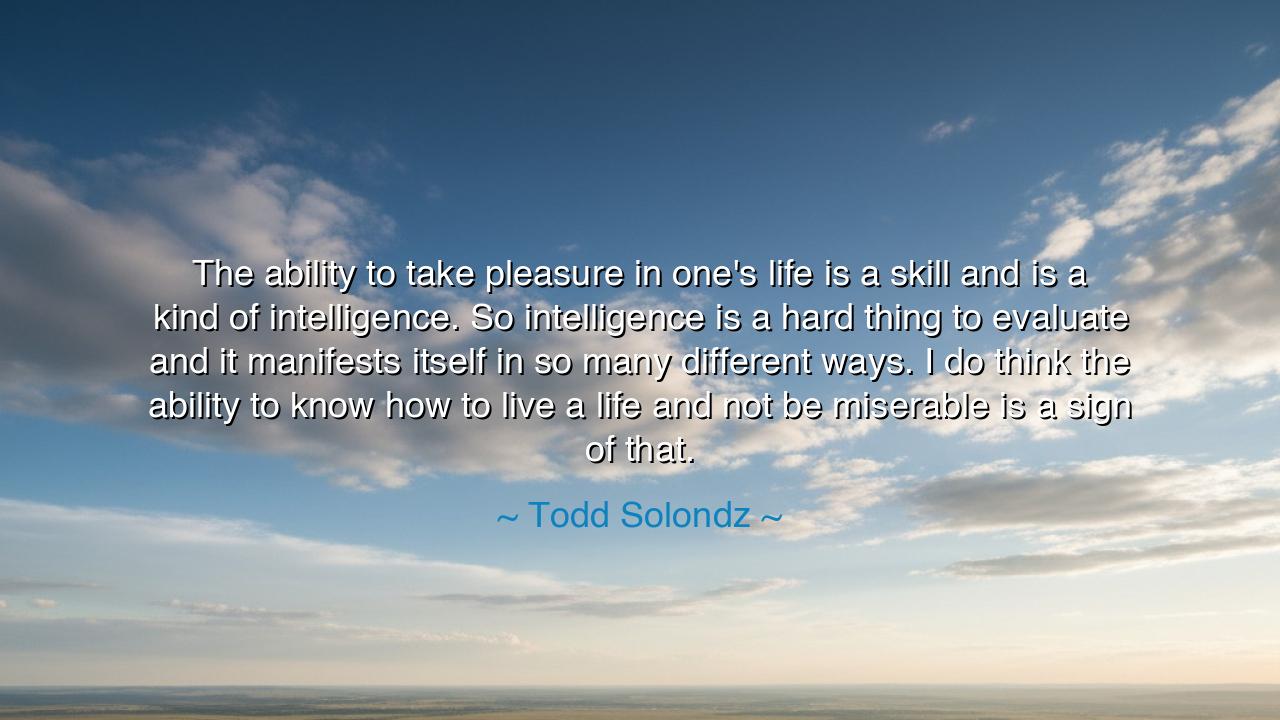
The ability to take pleasure in one's life is a skill and is a
The ability to take pleasure in one's life is a skill and is a kind of intelligence. So intelligence is a hard thing to evaluate and it manifests itself in so many different ways. I do think the ability to know how to live a life and not be miserable is a sign of that.






The words of Todd Solondz, “The ability to take pleasure in one's life is a skill and is a kind of intelligence. So intelligence is a hard thing to evaluate and it manifests itself in so many different ways. I do think the ability to know how to live a life and not be miserable is a sign of that,” rise like a quiet revelation—a gentle flame that burns not for glory, but for understanding. In this age-old truth, spoken through modern lips, we are reminded that intelligence is not confined to reason, calculation, or the solving of riddles; it is the wisdom to dwell in one’s own existence without despair. To find pleasure in life, to live with contentment and balance, is no lesser art than the writing of philosophies or the building of empires. It is the art of being at peace with the mystery of being alive.
Solondz, a filmmaker known for his stark explorations of human longing and alienation, speaks not as a preacher of comfort but as one who has stared into the shadow and understood its weight. His words are not born of naivety; they are forged in the fire of observation. He has seen that many who possess keen intellects—scholars, poets, thinkers—are often tormented, trapped in their own restless intelligence, unable to rest in the simple joy of being. Yet, he tells us, there exists another form of wisdom, quieter and less celebrated: the intelligence of living well, of finding meaning in daily light and small mercies, of choosing not misery, but awareness.
This truth is as old as civilization itself. In the ancient days of Greece, the philosopher Epicurus taught that the highest form of intelligence was not endless pursuit of knowledge, but the cultivation of tranquility—ataraxia, the untroubled mind. He gathered his followers in gardens, not academies, teaching them to enjoy bread, friendship, and the warmth of the sun. For him, pleasure was not indulgence but insight: the recognition that happiness comes from harmony between desire and simplicity. What Solondz calls “the ability to know how to live” was, for Epicurus, the greatest wisdom of all—the knowledge of enough.
And yet, the path to such wisdom is not easy. For the mind, ever hungry for meaning, turns often against itself. The intelligent man may overthink his joys until they wither beneath analysis; the artist may dissect beauty until only bones remain. To be able to take pleasure in life requires a discipline of the soul—a deliberate gentleness. It is to say to oneself, “I will not be ruled by the storms of thought; I will find stillness in the midst of motion.” This, too, is intelligence: not the conquest of the mind, but its taming.
Consider the story of Marcus Aurelius, the philosopher-emperor. He governed an empire and bore the weight of war and loss. Yet each dawn, he wrote in his journal not of triumph, but of gratitude: gratitude for waking, for breathing, for seeing the sky. He understood that to “not be miserable” in a world so easily darkened by fate was a victory greater than any battle. His intelligence was not only in his reason but in his serenity—in knowing how to live within himself even while surrounded by chaos. His wisdom was not cold but luminous, born from the discipline of peace.
From Solondz’s insight, we learn that intelligence wears many faces. It is the scientist’s curiosity, the poet’s vision, but also the child’s laughter, the elder’s calm, the gardener’s patience. It is the understanding that life is not a problem to be solved, but a moment to be inhabited. The one who can savor a cup of tea, forgive an insult, or stand in the rain without resentment has touched a form of wisdom the world too often overlooks. The skill of joy is learned, not given—it is cultivated like a garden through mindfulness, gratitude, and restraint.
Therefore, take this as your counsel, O seeker of meaning: learn the art of living as you would learn any craft. Practice contentment. Observe beauty without grasping at it. Let small pleasures be enough, and let your days unfold with grace rather than greed. When pain comes, as it always does, meet it not with despair but with curiosity—with the quiet knowing that even suffering deepens one’s understanding of life.
For the truest sign of intelligence is not the brilliance of the mind, but the serenity of the spirit. To live without misery, to find pleasure in existence itself, is to achieve a harmony greater than any intellect alone can give. Remember this, and live wisely: seek not to know everything, but to love your own life deeply and well. In doing so, you will discover the oldest form of genius—the intelligence of joy.






AAdministratorAdministrator
Welcome, honored guests. Please leave a comment, we will respond soon